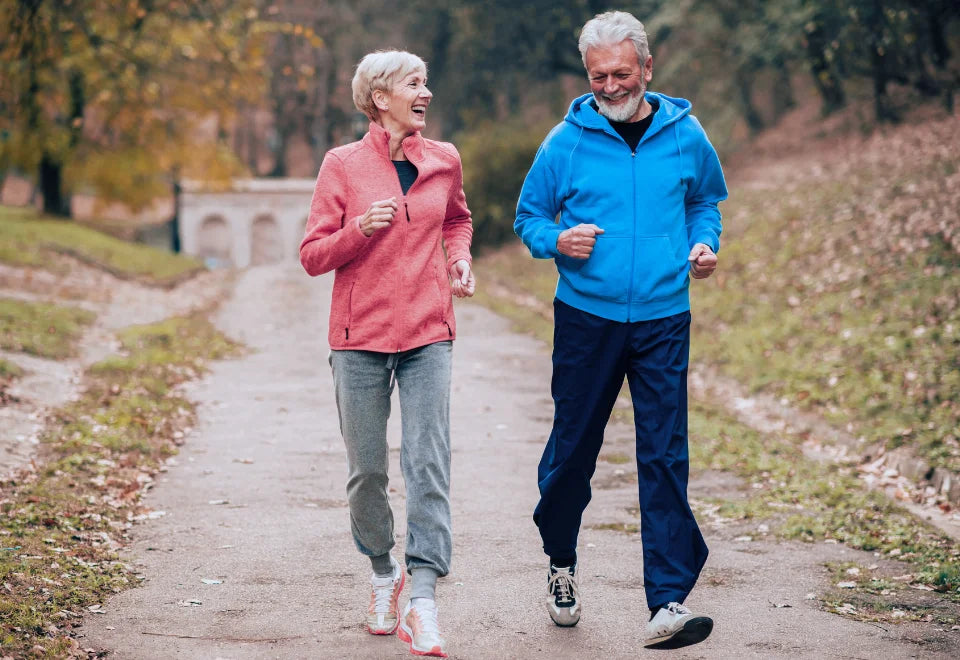By 2025, clinical trials in longevity science are advancing our understanding of ageing and how to potentially slow it down. Here's a quick look at key findings:
- NMN & Resveratrol: Boosted NAD⁺ levels in heart and muscle tissues, with human trials showing improved physical performance and well-being.
- Biomarkers for Ageing: Researchers are refining tools to measure biological age, including epigenetic profiling and blood-based tests.
- Therapeutic Interventions: Senolytics and telomerase therapies show promise for extending healthspan.
- Personalized Testing: Platforms like Decode Age analyze biomarkers to tailor treatments.
Despite progress, challenges like participant retention and funding limit long-term studies. Future goals include better biomarkers, diverse population studies, and standardized clinical protocols. These developments could lead to more personalized, accessible ageing interventions.
2025 Clinical Trial Progress
Recent trials are reshaping how we understand and tackle ageing interventions.
NMN and Resveratrol Research
Research highlights a strong synergy between NMN and Resveratrol. In mice, combining these compounds boosted NAD+ levels by 1.59 times in heart tissue and 1.72 times in skeletal muscle within six hours. Human clinical trials on NMN supplementation have confirmed its safety at doses ranging from 100 to 1,250 mg daily. These trials also revealed notable improvements across several health markers:
| Health Marker | Improvement Observed |
|---|---|
| Blood NAD+ Levels | Increased |
| Skeletal Muscle Function | Better insulin signaling |
| Physical Performance | Higher scores in 6-minute walk test |
| Overall Well-being | Improved SF-36 scores |
Meanwhile, Harvard researchers are advancing ageing diagnostics through biomarker validation.
Harvard Ageing Biomarker Studies
Harvard teams are making strides in identifying and validating biomarkers for ageing. Their work focuses on measuring biological age with precision, moving away from traditional chronological measures. They emphasize the role of epigenetic shifts in the ageing process.
Human Longevity Lab Results
Northwestern University's Human Longevity Laboratory at Feinberg School of Medicine is diving deep into ageing across multiple body systems. Their program includes epigenomic profiling, assessments of cardiovascular and neurocognitive functions, and validation of potential ageing treatments.
Additionally, findings show that maternal nutrient restrictions during pregnancy can influence offspring ageing through mitochondrial programming. This connection increases risks for conditions like cardiometabolic and kidney diseases, highlighting how early-life factors significantly shape long-term health outcomes.
sbb-itb-55c436e
New Longevity Research Methods
Longevity research has made major strides, with new approaches shedding light on the science of ageing. Advanced testing techniques now offer a clearer picture of how biological ageing works.
Custom Health Analysis
Some companies are leading the way in creating comprehensive tools to analyze ageing. For example, Decode Age has introduced a platform that evaluates over 70 biomarkers through blood tests, offering a detailed look into biological age.
Here’s a breakdown of key testing protocols:
| Analysis Type | Markers Measured | Clinical Applications |
|---|---|---|
| Blood-Based Age Tests | 70+ biomarkers | Biological age, metabolic health |
| Gut Microbiome Analysis | 30+ features | Microbial diversity, digestive health |
| Epigenetic Profiling | DNA methylation | Cellular ageing indicators |
These personalized tests are helping refine how supplements and other interventions are evaluated for their impact on ageing.
Testing and Supplement Science
Advances in supplement science are now closely tied to these cutting-edge testing methods. At the Longevity Med Summit, researchers highlighted breakthroughs in understanding how compounds like Spermidine affect cellular ageing.
Using sophisticated molecular profiling, scientists are validating the effectiveness of various longevity treatments. The summit also stressed the importance of standardizing data collection across clinics to encourage collaboration and drive progress.
By focusing on individual health profiles, researchers are tailoring interventions based on factors like:
- Epigenetic markers and their reaction to treatments
- Microbiome diversity and its role in ageing
- Metabolic health and its link to biological age
This approach helps researchers fine-tune strategies to slow ageing, paving the way for more personalized and effective longevity solutions.
Research Limits and Next Steps
Long-Term Study Issues
Long-term clinical trials in longevity research come with several hurdles. One of the biggest challenges is keeping participants engaged throughout the study. Trials lasting more than two years often see high dropout rates, which can disrupt data quality and reliability.
Here’s a quick look at the main challenges and their effects:
| Challenge | Impact |
|---|---|
| Participant Retention | Dropouts lead to inconsistent data |
| Funding Sustainability | Limited resources hinder long-term studies |
| Ethical Considerations | Restrictions on testing certain interventions |
Funding and ethical concerns also make long-term studies difficult. Research spanning decades requires significant resources for monitoring health, collecting data, and conducting analysis. Unfortunately, current funding models tend to prioritize short-term projects, leaving long-term studies underfunded.
Overcoming these barriers is crucial for advancing longevity research.
Next Research Goals
To address these challenges, researchers are focusing on several key areas:
- Biomarker Discovery: Developing better tools to measure biological ageing across different populations.
- Intervention Validation: Evaluating the long-term effectiveness of compounds like NMN and resveratrol.
- Population Studies: Expanding cohort studies to include a more diverse range of ethnic and socioeconomic groups.
Standardizing how data is collected will also help researchers compare results across studies. This will make it easier to evaluate how different interventions perform, no matter where the research takes place.
Conclusion
Main Points Summary
Clinical trials in 2025 have made strides in longevity science. Northwestern's Human Longevity Lab has validated methods to potentially slow or reverse ageing by examining the connection between chronological and biological age. Trials combining NMN and Resveratrol have shown improved NAD⁺ levels, indicating possible benefits for cardiovascular health and reducing frailty. These findings open doors to new treatment strategies.
Future Treatment Outlook
These results lay the foundation for the next wave of therapies. The Human Longevity Lab's upcoming trials aim to test treatments designed to slow ageing, potentially changing how age-related conditions are managed.
Key areas of future focus include:
| Focus Area | Expected Impact |
|---|---|
| Preventive Medicine | Incorporating longevity-focused interventions into everyday healthcare |
| Personalized Therapeutics | Tailored treatments based on individual ageing markers |
| Clinical Standardization | Consistent data collection protocols across longevity clinics |
"NAD⁺ boosters like NMN can help slow down the ageing process by boosting DNA repair", says Dr. David Sinclair.
These findings support earlier research and guide efforts toward personalized treatments and standardized clinical practices. Combining lifestyle changes with supplements like NMN, Resveratrol, and Berberine offers a promising approach to extending healthspan and enhancing life quality. This progress signals the potential for more accessible and effective ageing interventions.
FAQs
What are biomarkers of ageing, and why are they important?
Biomarkers of ageing are measurable indicators, such as epigenetic changes or blood-based tests, that provide insights into biological age rather than chronological age. Researchers are developing these biomarkers to better assess the effects of longevity interventions and track progress in slowing down the ageing process.
How do senolytics and telomerase therapies contribute to longevity?
Senolytics are therapies aimed at eliminating senescent cells, which accumulate as we age and contribute to age-related diseases. Telomerase therapies work on extending the protective caps at the ends of chromosomes (telomeres), potentially slowing the ageing process. Both have shown promise in extending healthspan, the period of life spent in good health.
What challenges do clinical trials in longevity face?
Clinical trials in longevity often face issues such as participant retention, with long-term studies seeing high dropout rates. Funding sustainability is another challenge, as these studies require significant resources, and many current funding models prioritize short-term research. Ethical considerations also limit the testing of certain interventions.
What are the next steps for longevity research?
The next steps in longevity research include improving biomarkers for biological age, validating the long-term effectiveness of compounds like NMN and Resveratrol, and expanding population studies to include a more diverse range of ethnic and socioeconomic groups. Standardizing data collection protocols will also make it easier to compare results across studies.




























1 comment
John Devine
Very interesting and informative. I was not aware of how far science had progressed in the step towards the actual goal of increasing longevity in humans I am now seeing an actual horizon approaching on a positive conclusion of human life span steadily increasing.
Just a point, it would be very helpful if the scribes could list all initials e.g. NMN IN A BIBLIOGRAPHY SO THE READERS ARE AWARE FULLY OF WHAT THEY MEAN.
Leave a comment
All comments are moderated before being published.
This site is protected by hCaptcha and the hCaptcha Privacy Policy and Terms of Service apply.